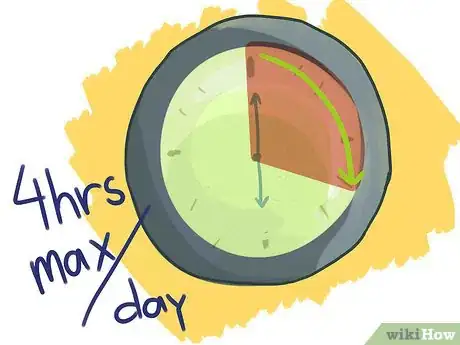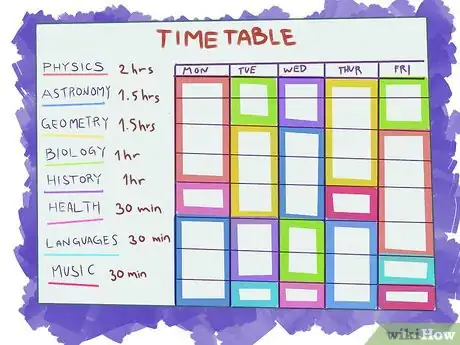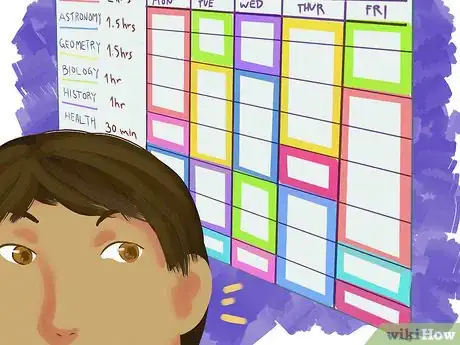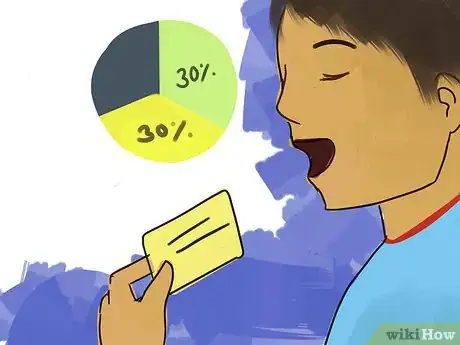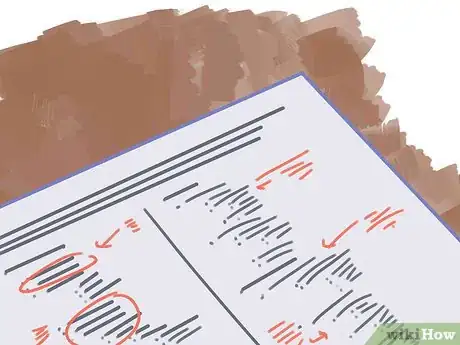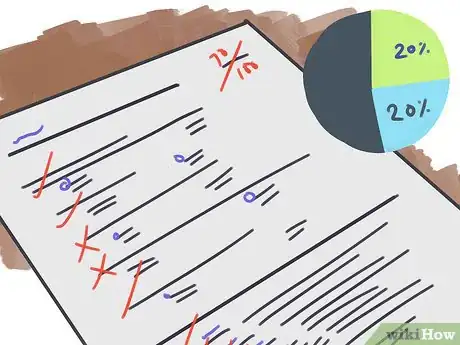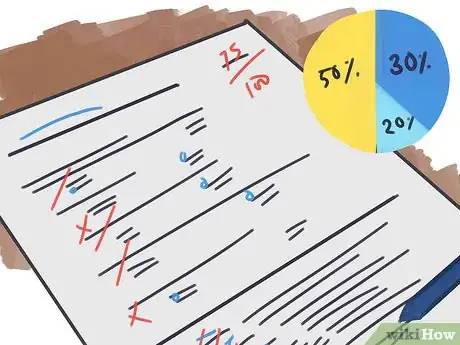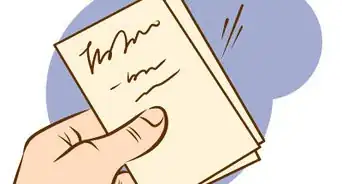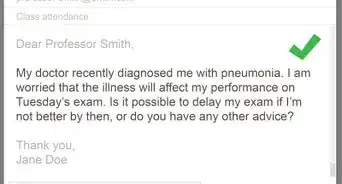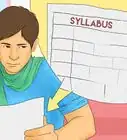X
wikiHow is a “wiki,” similar to Wikipedia, which means that many of our articles are co-written by multiple authors. To create this article, 30 people, some anonymous, worked to edit and improve it over time.
This article has been viewed 236,785 times.
Learn more...
You've got so many big exams coming up and you really need to revising. Trouble is, you've left it too late and there's barely any time left. Read on to find out how to make the most of your limited revision time by revising quickly and effectively.
Steps
Method 1
Method 1 of 8:
Creating a Timetable
-
1Write down all of the subjects you are currently studying. Be sure not to leave out any of them, even if you think you don't need to revise some topics.
-
2Order your subjects from most important to least important. This process requires a lot of thought, so be careful how you make your selections. Do not put your subjects in order of those you like best and least, but on how much work you think a subject needs.Advertisement
-
3Decide how many hours of study you ars going to do a day. If it's a week before the exams, aim for around 3-4 hours of good, solid revision. This means you'll have around 21-28 hours to revise in that week. If it's the night before the exams, aim for no more than three-four hours that day, so as not to stress yourself out.[1]
-
4Set your time per subject. Referring back to step two, dedicate how many hours/minutes you want to spend on each subject.[2]
-
5Draw up a clear revision timetable. Space out your subjects so you don't have all of your dreaded subjects on one day, but have a variety.[3]
-
6If you want more detail in your timetable, you can also list out the chapters that you will revise or exercises that you will do during each session. This will help keep you on track with your study goals.
-
7Follow your revision timetable as much as possible. Having a strict routine will make you revise better.[4] f
Advertisement
Method 2
Method 2 of 8:
Maths
-
1Spend 25 percent of your revision time looking through your workbook and making brief, short notes whilst reading it.
-
2Spend 50 percent of your time doing some past papers - they're the closest thing you'll get to the actual exam, so make the most of them.
-
3Spend the remaining 25 percent revising online, though make sure not to get distracted by Facebook or any other social networking websites. MyMaths.co.uk is a good site to revise from, with online lessons, homework and practice tests to test your knowledge. They cover the curriculum for 11 to 16 year olds.
Advertisement
Method 3
Method 3 of 8:
English Literature
Method 4
Method 4 of 8:
English Language
-
1Spend 25 percent of your time looking at past papers briefly and looking at the style of writing etc.
-
2Spend 25 percent of your time focusing on writing techniques and how to use them.
-
3Spend 25 percent of your time looking over your notes and re-writing them quickly.[5]
-
4Spend the remaining 25 percent practicing your writing style. storywrite.com is a website for people all over the world who wish to improve their writing. Check it out.
Advertisement
Method 5
Method 5 of 8:
Languages
-
1Spend 30 percent of your time focusing on your writing piece and taking in as much vocabulary as you can. Use your dictionary or an online dictionary to look up useful phrases and write them down in a notebook, trying to memorise them as you go.
-
2Spend 30 percent of your time focusing on your oral examination. Write down all of the possible questions that could come up on a separate piece of paper. Fold them up and put them into a hat. Draw a question out and see if you can answer it.
-
3Spend 20 percent of your time practising your listening skills. The best way to do this is to spend time highlighting important words on your vocabulary list and listen to listening tapes online.
-
4Spend the remaining 20 percent of your time practising your reading skills. Listening and reading kind of tie in together. Highlight the important words on your vocabulary lists and take a look at the past papers online.
Advertisement
Method 6
Method 6 of 8:
Science
-
1Spend 20 percent of your time looking through your notes so that you know what you need to know.
-
2Look through the Specification to your exam board paper. Make notes on each point so that they make sense to you.
-
3Spend at least 20 percent looking through past papers and maybe 25% on answering some questions from any revision books you may have.
-
4It is a good idea to briefly summarise your notes and if you are a visual learner, to summarise it all onto a mind map!
Advertisement
Method 7
Method 7 of 8:
Other Academic Subjects
-
1Spend 30 percent of your time re-writing notes quickly and trying to remember them. Highlight them in different colours if you are a visual learner, record yourself saying them if you are an auditory learner, or make a dance from them if you are a kinesthetic learner.[6]
-
2Spend the other 20 percent of your time reading or listening to notes and digesting them.[7]
-
3Spend 50 percent of your time taking past papers and testing yourself.
Advertisement
Method 8
Method 8 of 8:
Non-Academic Subjects
Community Q&A
-
QuestionShould we listen music when we are studying?
 Community AnswerWhatever works for you. Some people find music too distracting when studying, some find it helps them concentrate. Some people find music with lyrics distracting, but not instrumental music.
Community AnswerWhatever works for you. Some people find music too distracting when studying, some find it helps them concentrate. Some people find music with lyrics distracting, but not instrumental music. -
QuestionDoes studying early in the morning work?
 Community AnswerWaking up super early and studying isn't great because doing so interferes with sleep. But if you did get a good amount of sleep, then studying right after you wake up can be good because your brain is fresh. But don't make it too long. You can also try studying right before bed, which cements the information in your mind a lot better.
Community AnswerWaking up super early and studying isn't great because doing so interferes with sleep. But if you did get a good amount of sleep, then studying right after you wake up can be good because your brain is fresh. But don't make it too long. You can also try studying right before bed, which cements the information in your mind a lot better. -
QuestionIs it good to listen to music while studying?
 Community AnswerIt is good to listen to music without lyrics, like classical music, as it distracts you less. However, if it is distracting for you, you should not listen to music.
Community AnswerIt is good to listen to music without lyrics, like classical music, as it distracts you less. However, if it is distracting for you, you should not listen to music.
Advertisement
Warnings
- Don't lose motivation or give up hope.⧼thumbs_response⧽
- Don't lose sleep to exam revision.⧼thumbs_response⧽
- Try to stay away from others directly before and directly after an exam, they'll only make you worried.⧼thumbs_response⧽
- Cramming may stress you out.⧼thumbs_response⧽
- Use these techniques only as a last resort: slow and steady revision works better in the long-term.⧼thumbs_response⧽
- Don't revise the day of the exam, your revision won't sink in.⧼thumbs_response⧽
- Eating sugary foods will give you more energy, but don't eat too many or else you'll become too hyper to revise.⧼thumbs_response⧽
Advertisement
References
- ↑ https://www.bcu.ac.uk/exams-and-revision/time-management-tips/how-much-revision-should-i-do-a-day
- ↑ https://learningcenter.unc.edu/tips-and-tools/studying-101-study-smarter-not-harder/
- ↑ https://learningcenter.unc.edu/tips-and-tools/studying-101-study-smarter-not-harder/
- ↑ https://www.bbc.co.uk/bitesize/articles/zn3497h
- ↑ https://writingcenter.unc.edu/tips-and-tools/revising-drafts/
- ↑ https://writingcenter.unc.edu/tips-and-tools/revising-drafts/
- ↑ https://writingcenter.unc.edu/tips-and-tools/editing-and-proofreading/
About This Article
Advertisement


